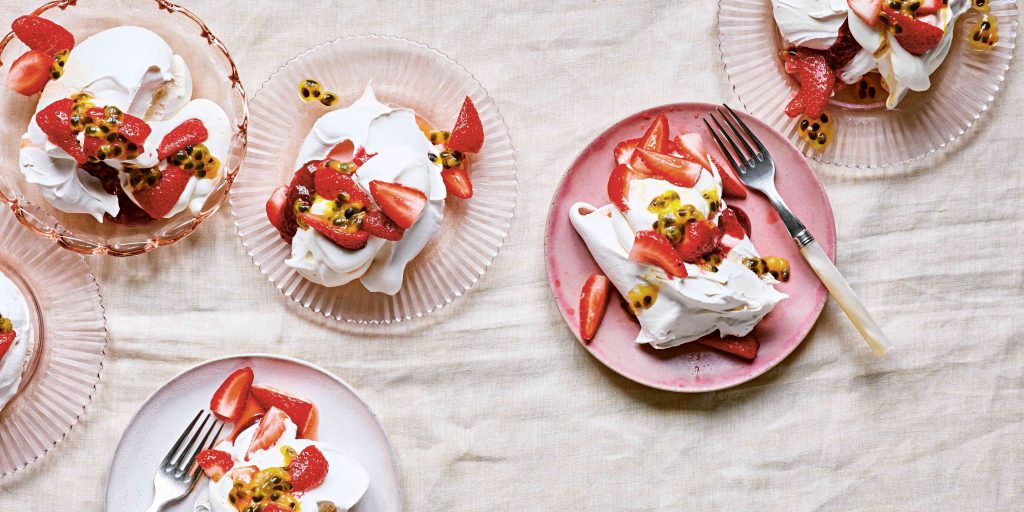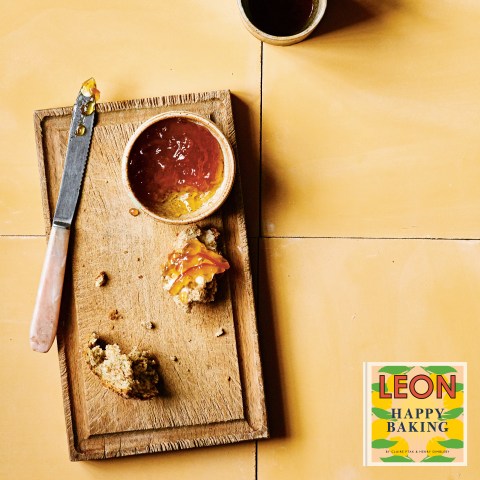Pavlova


SERVES: 6
PREPARATION TIME: 20 MINUTES COOKING TIME: 2 HOURS
WF GF V
3 free-range egg whites
1/4 teaspoon salt
1/2 teaspoon white wine vinegar
1/2 teaspoon pure vanilla extract
300g caster sugar, plus an extra 2 tablespoons, to serve
1 1/2 teaspoons cornflour
3 tablespoons raspberry jam, to serve
200ml double cream, lightly whipped, to serve
600g strawberries, to serve
3 passion fruit, to serve
There are hundreds of ways to dress a pavlova, but this is our favourite: simple and clean and drizzled with the sharp, juicy pulp of passion fruit. We like to serve it up on individual meringues, to make the recipients feel extra special.
Heat the oven to 120°C/250°F/gas mark ½. Line a baking sheet with baking paper.
Using an electric hand mixer, beat the egg whites, salt, vinegar and vanilla on a high speed until soft peaks form.
Whisk the 200g of sugar and the cornflour together by hand and add half to the frothy egg whites. Use the electric hand whisk to whip until very stiff, then add the remaining 100g of sugar. Whisk until smooth and glossy.
Spoon 6 large swoops of the meringue on to your baking sheet, 4cm apart.
Bake in the oven for about 2 hours, then check the meringues. Remove from the oven when dry and firm. It should be possible gently to peel them off the paper. If they stick to the paper they’re not ready. Cool completely.
To assemble, place the meringues on a large serving plate or individual plates. Put a spoonful of raspberry jam on each and then a generous dollop of cream.
Cut and quarter the strawberries and toss with the 2 tablespoons of caster sugar. Leave to macerate for a few minutes while you halve the passion fruits. To save time, you can prepare the strawberries up to 2 hours in advance and keep them in the fridge.
Stir the strawberries and divide between the pavlovas. Scoop out half a passion fruit on to each and serve.
TIPS
Baking with meringue can be intimidating, but it needn’t be when you know a few tricks and you have the right tools. An electric hand whisk or free-standing mixer is always going to make meringue-making easier. Meringue can take an incredible amount of beating (unlike cream) so it is hard to overdo it. Using a pinch of salt or a pinch of cream of tartar can help to stabilize the whites and keep them from ‘breaking’.
Whites are ‘broken’ when they develop a sandy texture and do not go glossy. Adding sugar gradually at the beginning of the whisking process is a good idea, to stabilize. If you are using caster sugar (as opposed to granulated sugar) the second half of it can go in all at once without causing any problems. The fine texture of caster sugar means it dissolves quickly and can be incorporated with no problem. Meringues can be made up to 5 days in advance and kept in an airtight container.
Recipe extracted from LEON Happy Baking by Claire Ptak and Henry Dimbleby





